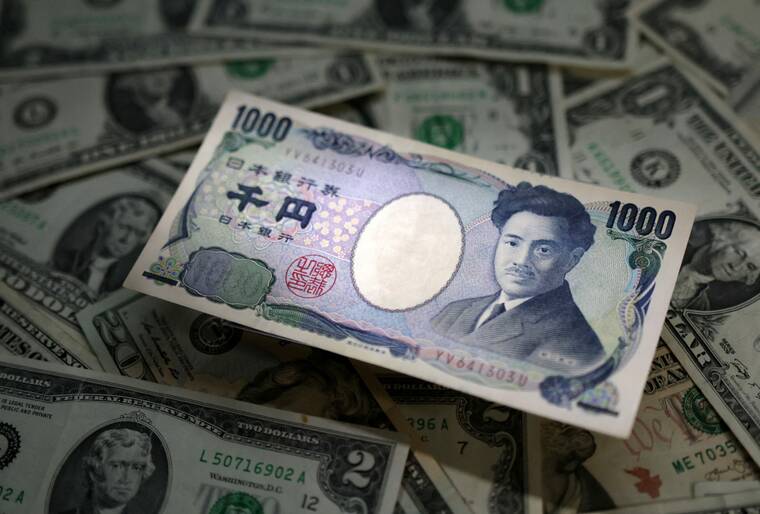Dollar softens, yen set for weekly fall

REUTERS/DADO RUVIC/ILLUSTRATION/FILE PHOTO
Yen and dollar banknotes are seen in this illustration in March 2023. The yen edged up against the dollar on Friday but looked on course for its biggest weekly decline since June after a slew of U.S. economic data eased fears of a recession and supported bets of gradual easing of monetary policy by the Federal Reserve.
TOKYO >> The yen edged up against the dollar on Friday but looked on course for its biggest weekly decline since June after a slew of U.S. economic data eased fears of a recession and supported bets of gradual easing of monetary policy by the Federal Reserve.
The dollar was softer against the yen at 148.73, but hovered close to Thursday’s high of 149.40, a level last seen on Aug. 2.
Risk-sensitive currencies such as sterling were firm as the improved economic outlook spurred a rally in equities.
Data on Thursday showed the number of Americans filing new applications for unemployment benefits dropped to a one-month low last week and U.S. retail sales increased by the most in 1-1/2 years in July, dashing expectations that the Fed could cut interest rates by a super-sized 50 basis points (bps) next month.
“We are in the camp that thinks growth slowdown is there, inflation is slowing and the Fed will start cutting rates but it’s not going to be a panic situation, which was turning into a narrative a week or two ago,” said Salman Ahmed, global head of macro and strategic asset allocation at Fidelity International.
“We remain of the view that we’ll see 2-3 cuts, very likely two rather than three unless the increased unemployment rate that we saw in the last payrolls report sustains.”
Don't miss out on what's happening!
Stay in touch with breaking news, as it happens, conveniently in your email inbox. It's FREE!
Traders are convinced the Fed will slash rates on Sept. 18, but had debated the size of the reduction after surprisingly soft U.S. payrolls data had pushed the odds of the larger 50 basis-point cut to 71% in early August.
Odds for such a move currently stand at 28%, down from 36% a day earlier, according to the CME Group’s FedWatch Tool.
The dollar index, which measures the greenback against six major peers, eased 0.2% to 102.84 as of 0830 GMT.
YEN STILL WEAK, POUND A BRIGHT SPOT
The Japanese yen has continued to draw eyes, and with losses of about 1.4%, the currency was on track for its biggest weekly drop in almost two months.
The move was almost as dramatic as its surge to as strong as 141.675 yen per dollar on Aug. 5 as the Bank of Japan’s surprise rate hike, combined with the flare-up in U.S. recession worries, sparked an aggressive unwinding of yen-financed carry trades.
Some calm was restored after influential BOJ deputy governor Shinichi Uchida said the central bank would not hike rates when markets are volatile, and there are signs traders have been rebuilding short positions.
“There’s a lot of room for (carry trades) to be wound up again. Uchida’s (dovish) guidance was quite strong. Foreign investors are going to take this as a dip-buying opportunity in dollar-yen,” Shoki Omori, chief Japan desk strategist at Mizuho Securities, said.
Official data shows plenty of flows are happening, and Japanese investors plowed the most money into long-term overseas bonds in 12 weeks in the week to Aug. 10, while foreigners net bought short-term Japanese debt after eight straight weeks of net sales.
Overseas investors also snapped up about $3.5 billion in Japanese shares, reversing three consecutive weeks of net selling.
Sterling rose 0.2% to $1.2886 – its highest since July 29 – on the back of positive economic data. The currency was on track for a 1% weekly rise, its best performance in more than a month.
British retail sales edged up in July, boosted in part by extra spending due to the men’s Euros soccer championship, official figures showed after an unusually cool and wet June had kept shoppers away.
The euro added 0.1% to $1.0987. The common currency touched its highest level since Jan. 3 earlier this week, helped by a drop in the dollar after soft data.
Additional reporting by Kevin Buckland in Tokyo and Sruthi Shankar in Bengaluru.



